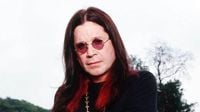Ozzy Osbourne, the legendary frontman of Black Sabbath and a defining voice in heavy metal, passed away on Tuesday, July 22, 2025, at the age of 76, just weeks after his emotional farewell concert in his hometown of Birmingham, England. His family confirmed the news in a heartfelt statement, saying he died surrounded by love and with his family by his side. "It is with more sadness than mere words can convey that we have to report that our beloved Ozzy Osbourne has passed away this morning," the statement read. "We ask everyone to respect our family privacy at this time." The exact cause of death was not immediately disclosed.
Osbourne's final concert, held at Villa Park and dubbed "Back to the Beginning," marked Black Sabbath's first performance together in two decades and was billed as his "final bow." The event drew 42,000 fans and featured appearances from iconic bands like Metallica, Guns N' Roses, Slayer, and Tool, as well as guest appearances from musicians such as Tom Morello and Steven Tyler. From his throne onstage, Osbourne thanked fans "from the bottom of my heart," a poignant moment for a career that spanned over five decades.
Born John Michael Osbourne on December 3, 1948, in Birmingham, England, Ozzy grew up in a working-class family. He left school at 15 and cycled through a variety of odd jobs before finding his way into music. Inspired by The Beatles' 1963 hit "She Loves You," he was drawn to the burgeoning rock scene. In 1967, he joined forces with bassist Geezer Butler, guitarist Tony Iommi, and drummer Bill Ward to form a band that would eventually become Black Sabbath. The group’s name was inspired by the American title of an Italian horror movie, reflecting the dark, ominous tone that would define their sound.
Black Sabbath's self-titled debut album, recorded in just two days in 1969, is often regarded as the "Big Bang of heavy metal." Its eerie, heavy riffs and lyrics about alienation and doom struck a chord amid the turbulent social landscape of the Vietnam War era. Their follow-up album, "Paranoid," released in 1970, featured enduring classics such as "War Pigs," "Iron Man," and "Fairies Wear Boots." While the title track "Paranoid" peaked at No. 61 on the Billboard Hot 100, it became the band's signature song and a metal anthem. Both albums were later voted among the top 10 greatest heavy metal albums of all time by Rolling Stone readers.
Osbourne’s distinctive voice and stage presence earned him the nickname "The Prince of Darkness," a moniker he embraced despite its controversial connotations. His onstage antics, including the infamous incident in 1982 where he bit the head off a live bat—an act he claimed was done in the mistaken belief the bat was rubber—cemented his reputation as rock’s wild man. His behavior often drew ire from religious groups and conservative figures; in 1990, then-Cardinal John J. O’Connor accused his music of causing demonic possession and suicide, claims Osbourne dismissed with sharp rebuttals.
Despite his success, Osbourne’s career was marred by struggles with substance abuse. His excesses led to his firing from Black Sabbath in 1979. However, he rebounded swiftly, launching a solo career that began with the 1980 album "Blizzard of Ozz," featuring hits like "Crazy Train." His follow-up album, "Diary of a Madman," released in 1981, further solidified his solo status. Tragically, his gifted guitarist Randy Rhoads died in a plane crash in 1982; Osbourne honored him with the live album "Tribute." Over the years, he collaborated with other notable guitarists, including Jake E. Lee and Zakk Wylde, producing a string of successful albums and hits.
Osbourne’s influence was recognized with two inductions into the Rock & Roll Hall of Fame—first with Black Sabbath in 2006 and then as a solo artist in 2024. At the latter ceremony, actor Jack Black lauded him as the "greatest frontman in the history of rock ‘n’ roll" and "the Jack Nicholson of rock." Osbourne’s career also garnered five Grammy Awards, including two in 2022 for his album "Patient Number 9," which featured collaborations with legends like Jeff Beck and Eric Clapton.
In addition to his music, Osbourne became a household name through the MTV reality show "The Osbournes" (2002–2005), which offered an unfiltered glimpse into his family life. The show won a Primetime Emmy and introduced a new generation to the man behind the metal persona. His wife Sharon Osbourne, whom he married in 1982 after a tumultuous courtship, managed his career and became a celebrity in her own right. Together, they raised three children: Aimee, Kelly, and Jack. Osbourne also had two children, Jessica and Louis, from his first marriage to Thelma Riley.
Despite his hard-partying reputation, Osbourne’s later years were marked by serious health challenges. In 2019, he suffered a severe fall and battled pneumonia, leading to multiple surgeries, including one that left him "virtually crippled." In 2020, he publicly revealed his diagnosis of Parkinson’s disease, a progressive neurological disorder that affects movement. Even as the disease progressed, Osbourne remained determined to perform, culminating in his final concert in July 2025.
His openness about his health struggles helped raise awareness for Parkinson’s disease. Helen Matthews, CEO of Cure Parkinson’s, praised Osbourne for significantly raising the profile of the illness and supporting children’s hospitals. The upcoming Paramount+ documentary "Ozzy Osbourne: No Escape From Now," filmed over three and a half years, promises an intimate look at his life, struggles, and farewell performance.
Osbourne’s impact extended beyond music and television. He was a passionate advocate for animal rights, supporting campaigns against trophy hunting alongside his wife. His legacy also includes an Amazonian bat frog named Dendropsophus ozzyi in his honor. A lifelong supporter of Aston Villa Football Club, his final concert at Villa Park was a poignant homecoming.
Tributes poured in from across the globe following his death. Fellow musicians like Metallica, Aerosmith, Iron Maiden, and Queen expressed their sorrow and admiration. Celebrities such as Lady Gaga paid homage by performing his songs, while figures like Gene Simmons called him "universally beloved" and "a unique, lovable person." Osbourne’s original Black Sabbath bandmates—Tony Iommi, Geezer Butler, and Bill Ward—shared heartfelt messages mourning the loss of their "brother."
Osbourne’s life was a tapestry of highs and lows, from pioneering heavy metal’s darkest sounds to revealing a softer, more human side on reality TV. He embraced controversy and chaos but also showed resilience, reinvention, and deep love for his family and fans. As he once said about his own funeral plans, he wanted it to be a celebration, not a mournful event, with pranks and gratitude, reflecting the spirit he carried throughout his life.
Ozzy Osbourne leaves behind a monumental legacy as a trailblazer of heavy metal, an enduring cultural icon, and a figure whose voice and spirit resonated with millions worldwide. He is survived by his wife Sharon and their children, as well as his children from his first marriage. His music and influence will continue to echo through the generations to come.


